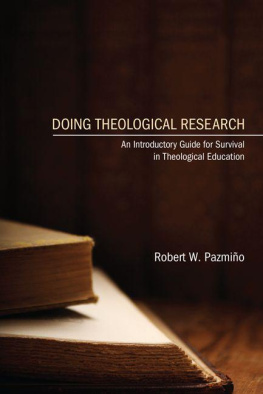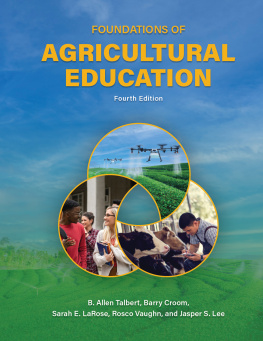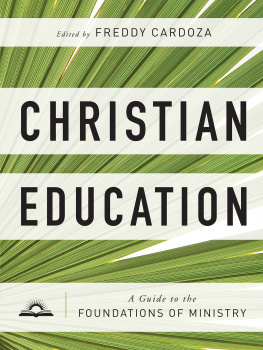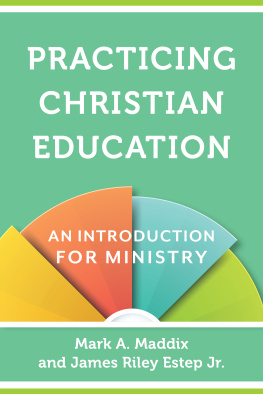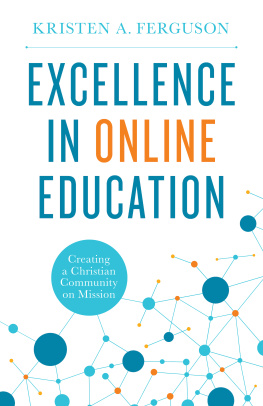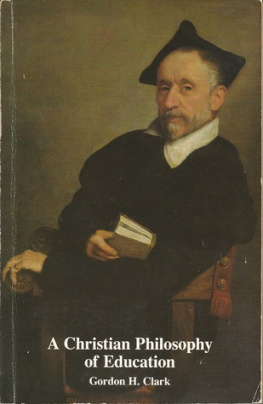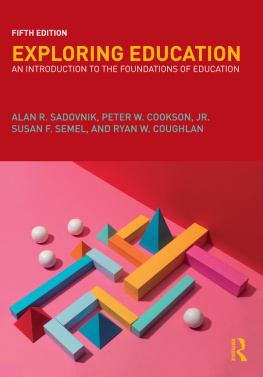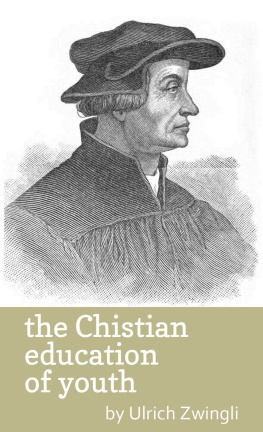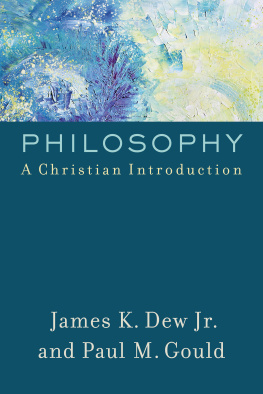Foundational
Issues in
Christian Education
Foundational
Issues in
Christian Education
An Introduction in
Evangelical Perspective
Third Edition
Robert W. Pazmio

2008 by Robert W. Pazmio
Published by Baker Academic
a division of Baker Publishing Group
P.O. Box 6287, Grand Rapids, MI 49516-6287
www.bakeracademic.com
Printed in the United States of America
All rights reserved. No part of this publication may be reproduced, stored in a retrieval system, or transmitted in any form or by any meansfor example, electronic, photocopy, recordingwithout the prior written permission of the publisher. The only exception is brief quotations in printed reviews.
Library of Congress Cataloging-in-Publication Data
Pazmio, Robert W., 1948
Foundational issues in Christian education : an introduction in evangelical perspective /
Robert W. Pazmio.3rd ed.
p. cm.
Includes bibliographical references.
ISBN 978-0-8010-3593-7 (pbk.)
1. Christian education. I. Title.
BV1471.2.P39 2008
268dc22 2008003935
Unless otherwise indicated, Scripture quotations are from the HOLY BIBLE, NEW INTERNATIONAL VERSION. NIV. Copyright 1973, 1978, 1984 by International Bible Society. Used by permission of Zondervan. All rights reserved.
Scripture quotations labeled NRSV are from the New Revised Standard Version of the Bible, copyright 1989, by the Division of Christian Education of the National Council of the Churches of Christ in the United States of America. Used by permission. All rights reserved.
To
Albert A. Pazmio
19091986
My father and a modern-day Andrew
and
Laura R. Pazmio
19202007
My mother and a postmodern Dorcas
Contents
Appendix A: Singing the Lords Song in a Foreign Land
Proclaiming Truth in a Postmodern Setting
Appendix B: Crossing over to Postmodernity
Educational Invitations
In commenting on the future of Christianity in 1995, the theologian Alister McGrath saw the potential for evangelical Christians to make a contribution. This continuing contribution relates to the viability of orthodoxy and the need to teach a living faith for the postmodern world. For this to be possible, Christians are called to be faithful in the theory and practice of Christian education to assure the transmission of a living faith to the rising generations. In support of this task, Christian educators are called upon to reappraise their thought and practice in relation to the foundational issues of Christian education. These foundational issues represent perennial or recurrent questions for those involved in the teaching ministries of the church. They deserve careful consideration by those who reflect upon their ministries of the past, present, and future.
This book in its third edition explores the disciplines used to form a holistic and integrated conception of Christian education from which guiding principles and guidelines for practice can be drawn. Christian educators who are evangelical in theological orientation need to make a concerted effort to affirm the biblical insights that provide the essential authority for theory and practice. Christians also need to incorporate insights from other disciplines. Such incorporation, however, is subject to the continuing authority of Gods Word as found in Scripture. By critically exploring the various foundations that have been and are predominant in Christian thought, educators can better deal with current needs and future challenges.
Christian educators have been conscious of the need to balance concerns for both continuity and change. Continuity is affirmed in emphasizing essential biblical truths that have guided the Christian faith and educational ministries throughout the centuries. Change is affirmed in emphasizing the need for applying theological truths in relation to specific historical, cultural, social, and personal variables. This effort requires careful reappraisal of biblical and theological sources, as well as evaluation of the various trends that are confronting the wider society and world.
In exploring these areas, it is appropriate to pose questions that have continuing significance in Christian education. A European educator once confronted an educator from the United States with the observation that American educators are always raising questions and never answering them. In response to this remark, the educator from the United States asked yet another question, Is that so? To avoid this real danger, we must propose possible answers to the questions that are raised for consideration.
It is crucial that foundational questions be raised by Christian educators before they form a set theory and practice of Christian education. Raising these questions enables Christian educators to explore new possibilities and to consider new wineskins for Christian education. Through such exploration, persons concerned with education in various settings can identify principles and implications for practice.
At each point in the process, thought and practice are subject to the continuing authority of Gods written Word. The Bible is a critical instrument that discerns and judges the educator, the educatee, and the educational process. By exploring biblical and theological foundations first, Christian educators can affirm transcultural universals that may then guide all educational conceptions and efforts. The consideration of biblical and theological foundations can also serve to identify distinctive assumptions that Christians bring to their thought and practice of education. The consideration of philosophical foundations also assists the educator in specifying cultural universals in the purposes of education and the nature of knowledge. Transcultural and cultural universals are elements of continuity, less subject to change and various contingencies, though not exempt from interpretation in each educational setting.
Figure 1
Foundations, Principles, and Practices

The second step in the educational process involves the investigation of cultural variables through the disciplines of history and sociology, or anthropology. This step provides the Christian educator with a sense of his or her location in time and space. Cultural variables give the educator a sense of context, though cultural variables are more subject to the variations of time and space. Yet these cultural and subcultural variables are no less the concern of the Christian educator who seeks to contextualize her or his educational efforts. Thus the Christian educator endeavors to make the universal and transcultural truths of Gods revelation real to those participating in the educational event. The educator seeks to so know, understand, and love students that her or his teaching speaks directly to the students needs and concerns. This, of course, does not exclude the educators role as one who raises critical questions and provides perspectives unknown to the students. But some sense of ones location in time, space, and society is crucial for faithful educational practice.
Beyond the questions of cultural universals and variables, the educator is confronted with individuals to whom she or he is responsible. The Christian educator needs to consider psychological foundations in order to discern the personal and group variables that influence education. In particular, the students or those being educated who are present and involved, voluntarily or involuntarily, must be considered. Also, educators are responsible to parents, administrators, boards, peers, pastors, and a host of other persons and groups, depending on the context of service. Psychological foundations provide insights to understand how persons develop, learn, and interact with others. Insights are also derived from sociological foundations for understanding how the teacher herself or himself relates and interacts with a variety of other persons, groups, and structures endemic to educational settings, whether in the home, the school, the church, or the community. The impact of sociological factors on psychological foundations indicates the interactions of the various dimensions of the educational process, as well as the potential limitations of a strictly systemic or analytical view of education. The diagramming of the system and process in figure 1 should include several connecting lines between each of the steps to reflect the complexity of the relationships. Additional lines could also be drawn to note the feedback from actual educational practices to the various foundations and their issues.
Next page

